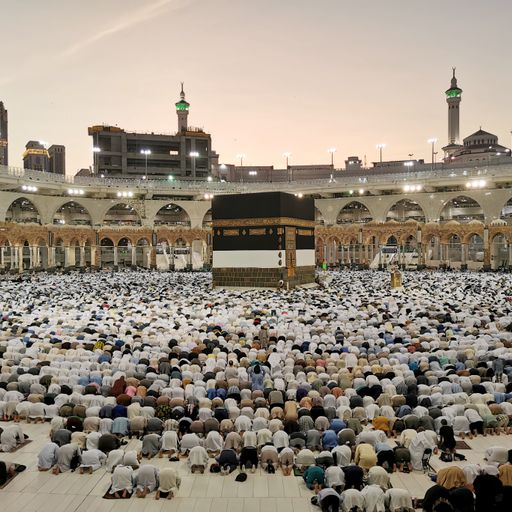Rising temperatures will make Hajj pilgrimages to Mecca dangerous, says study
A UK Muslim charity says the research shows it is "now or never" to take up the fight against climate change.
Thursday 22 August 2019 17:25, UK
British Muslims are being urged to take the lead on fighting climate change as a study suggests rising temperatures will make pilgrimages to Mecca dangerous.
The Hajj, one of the five pillars of Muslim faith, takes place in and around the city situated in a desert valley in western Saudi Arabia.
All Muslims are expected to take part at least once in their lifetime, if their health and finances allow.
The timings of the annual religious event shift each year because it is based on the lunar calendar, and it involves spending around 20 to 30 hours outdoors over a period of around five or six days.
The Saudis want to increase the number of pilgrims to 10 million by 2030.
Researchers at the Massachusetts Institute of Technology in California say rising global temperatures could push up heat and humidity in the region in the hottest summer months to the extent that people face "extreme danger" to their health.
Elfatih Eltahir, the civil and environmental engineer who led the research, said: "When the Hajj happens in summer, you can imagine, with climate change and increasing heat-stress levels, conditions could be unfavourable for outdoor activity.
"Hajj is the largest gathering of Muslims in the world. We are trying to bring in the perspective of what climate change could do to such large-scale outdoor activity."
The risks may already be great this year and next year, and could get worse when the Hajj takes place again from 2047 to 2052 and from 2079 to 2086, according to the study, published in the journal Geophysical Review Letters.
The researchers said global warming was inevitable, but the situation will be more severe if nothing is done.
Tufail Hussain, director of Islamic Relief UK, said in response to the study: "With the threat of catastrophic global heating becoming more evident each year, Islamic Relief UK is calling on the British Muslim community to take action before it is too late.
"It is time for the Muslim community to become the leaders in the fight, with not just countries such as Bangladesh and Pakistan under threat now, but increasingly the holy site of Mecca.
"If we don't act now, not only will people suffer the impact of more frequent and intense disasters, but our children born from today will no longer be able to perform the sacred duty of Hajj."
The charity is encouraging people to lobby their MPs to urge immediate government action to address the climate issue, and push for the UK to reach "net zero" emissions by 2045 or before.





